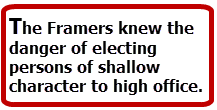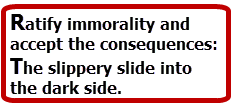The Presidential Pardon Power
What If Trump Offed Melania?
Posted June 27, 2018 01:35 pm | Op-Ed
 When
I saw media reports that Melania Trump had not been seen
for 20-some days, I started thinking again about the
Constitution, the Pardon Power and the nature of the
rule of law. Such are modern times. What if Trump did
it? I wondered, “What if he had shot someone on 5th
Avenue in broad daylight? What if he had offed Melania?”
Could he pardon himself?
When
I saw media reports that Melania Trump had not been seen
for 20-some days, I started thinking again about the
Constitution, the Pardon Power and the nature of the
rule of law. Such are modern times. What if Trump did
it? I wondered, “What if he had shot someone on 5th
Avenue in broad daylight? What if he had offed Melania?”
Could he pardon himself?
I like to rely on the actual language of the Constitution to answer such questions, resorting to writings of the Framers only in the event of ambiguity. Here is the Pardon Power granted by Article II, Section 2 of the Constitution:
The President...shall have Power to grant Reprieves and Pardons for Offences against the United States, except in Cases of Impeachment.
Since the Constitution was written for the people, not the lawyers, it is usually pretty easy to read. The President is granted broad power to pardon anyone for an offense against the US (state crimes for the same act can still be prosecuted), so long as the offense has been committed prior to the pardon. No power is granted to pardon for planned or future offenses. There is no limit in the language on the President’s power to pardon the President himself (except if impeached.)
I concluded that if Trump had offed Melania, he could pardon himself and avoid federal prosecution. State law prosecution would still lie for murder.
Pardoning one’s self is unsatisfactory to many. The Framers knew this defect existed. However, they believed the power of clemency to be so important and giving the power of mercy to the government so essential that acceptance of the defect was necessary to ensure the possibility of mercy.
 The
Framers did not turn a blind eye to this defect. They
warned the American people in the Federalist Papers that
it was their job to ensure they did not elect a
President of such tawdry character, such shameful
morals, such disregard for the rule of law, that he or
she would be liable to commit a crime and, if having
done so, would claim to be above the law applying to all
other Americans, and pardon him or herself.
The
Framers did not turn a blind eye to this defect. They
warned the American people in the Federalist Papers that
it was their job to ensure they did not elect a
President of such tawdry character, such shameful
morals, such disregard for the rule of law, that he or
she would be liable to commit a crime and, if having
done so, would claim to be above the law applying to all
other Americans, and pardon him or herself.
The Framers knew the danger of electing persons of shallow character to high office. They had, after all, dealt with the insanity of George III and had learned the necessity of avoiding unfit persons.
The Framers and the anti-Federalists, who opposed the Constitution for giving the federal government too much power, pointed out that if the American people abandoned common sense and good judgment and elected as President a person of defective moral insight, dangers to the American people and good government would abound.
The framing generation warned repeatedly: elect decent, moral people dedicated to serving the republic, not themselves or the Republic could devolve into tyrannical government. As an added “protection” against demagogues, they had the Electoral College elect the President. But, no Constitution or law can save the people if they lose their judgment and elect a person of known defective character.
The Framers knew such a people, exercising the hard-won franchise of their ancestors, would themselves have lost their moral compass and have no one to blame but themselves for their devolution from republic to dictatorship.
Fortunately, the American people are by and large a moral people. They are capable of judgment. They know something may be technically legal and morally repugnant. Because most believe moral laws, derived from god, are prior to human law and take precedence over human law, the American People can repudiate legal actions that are immoral, such as a President who pardons himself for committing an offense against the United States.
 The
people can say, “You have the power,” but we decide you
do not have the moral right. Impeachment is one
response. Voting the offender out of office is another.
Ratify immorality and accept the consequences: the
slippery slide into the dark side.
The
people can say, “You have the power,” but we decide you
do not have the moral right. Impeachment is one
response. Voting the offender out of office is another.
Ratify immorality and accept the consequences: the
slippery slide into the dark side.
As for Melania, of whom I appear to have lost sight: good luck.
---------
Kary Love is a Michigan attorney, and is syndicated by PeaceVoice.
Graphics and layout by the Observer
This piece was reprinted by the Columbia County Observer with permission or license. Originally submitted at the end of May, many of the concepts are heightened in light of yesterday's Supreme Court Muslim ban decision.

 By
Kary Love
By
Kary Love